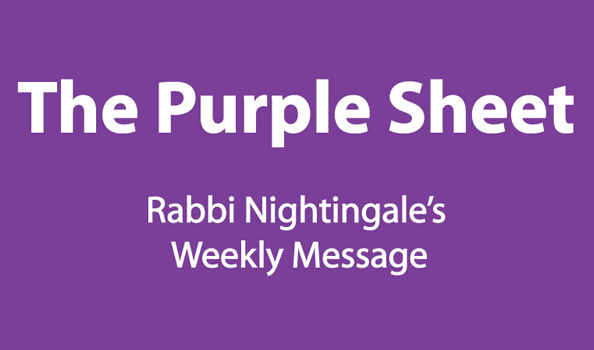Bloody Sacrifice
The Purple Sheet
Shabbat Parshat Tzav- March 25th/26th – ט’ו אדר ב תשע’ו
Bloody Sacrifice
For a long while I have been a big fan of the former chief rabbi of the UK, Rabbi Lord Jonathan Sacks. His predecessor however is not as well known these days, having died in 1999. Lord Rabbi Immanuel Jakobovits was the first rabbi to sit in the House of Lords and according to his obituary in The Guardian at the time, “He had the highest public profile of any chief rabbi, matched only by that of his successor, Jonathan Sacks. An expert on medical ethics, Jakobovits’s view was constantly sought by the media when issues of invitrio fertilization or transplant surgery arose.”
He was also instrumental in creating solid Jewish education in Britain among many other accomplishments. I had some personal interaction with him when we would visit London to see Karen’s family many years back and he, already retired, was the Rav of the smaller, earlier minyan at Raleigh Close synagogue. It was there that I was introduced to “The Authorised Daily Prayer Book of the United Hebrew Congregations of The Commonwealth”. (The Brits just love those long and cumbersome titles don’t they?) In that siddur, there is featured, in the last pages in fact, an excellent essay on Sacrifices written by Lord Rabbi Jakobovits.
It is the best explanation I have read on how Judaism deals with this issue, always a difficult topic. He points out the trouble with sacrifices whose “whole subject bristles with problems and the theme itself grates on many modern minds.” He then goes on to show that throughout Tanach, the entire Bible, there is a great ambivalence towards sacrifices. On the one hand they are extolled and called “holy”, yet on the other they are repeatedly dissed by prophets throughout the generations. From Samuel to Isaiah to Jeremiah along with the author of Psalms who writes (50:12-13) in a mocking fashion about the whole notion that God even needs them. “If I were hungry, I would not tell you? For Mine is the world and all that is in it! Do I eat the flesh of bulls or drink the blood of goats?!” The whole idea of an all powerful God needing sacrifices is a preposterous one.
He then explains that the key to understanding this ambivalence lies in the unique attribute that applies solely to sacrifices and no other mitzvot in the Torah. With sacrifices, if you had the wrong thought, the wrong intention on any level, it was disqualified and meant nothing. Not only did it not count, it counted against you. And this is what the prophets railed against time and again. If you think you can “buy off” God by bringing Him an offering, then not only is that ineffective, but it is disgusting in God’s eyes and He wished you would rather not insult Him with such idiocy.
With other mitzvot, if I do not have the purest intention, it still counts for something. If I give charity to get honour, it is still effective and I will be rewarded. But when it comes to sacrifices, not only is it not effective, it is counterproductive since it is perverting your relationship with God. So we see that sacrifices were a double edged sword on a certain level and could actually do as much damage as good.
Another key to understanding the true meaning of sacrifices is the law that dictates that a sin offering, a chatas, is only offered for unintentional sins. If a person sinned intentionally – sorry, you are out of luck and bringing Bessie up to the Temple will do you no good. So sacrifices were only effective when a person erred by mistake, had a lapse and was not paying enough attention. As such, this person needed a bit of a shock effect to regain his “moral regeneration”. And it is here that Rabbi Jakobovits makes the point that a person needed “an experience so awesome and powerful that it would leave a permanent mark on the offender’s consciousness, an experience so gripping that it would serve as a permanent deterrent to any renewal of momentary mindlessness.
This was the main object of atonement by sacrifice. The very horror of the experience provided a fail-safe shield against renewed forgetfulness. The slaughter of an animal, he sprinkling of its blood, the exacting ritual in the majestic atmosphere of the Temple – all this could not but provide an impregnable barrier to any renewed lapse in identical circumstances. That is the definition of atonement.”
When you consider all the necessary laws needed for a proper sacrifices, you get a sense of the narrow usage it had in Judaism. It was shock therapy for complacency and laziness that resulted in moral failings. And indeed sometimes we need just that – a slap on the bum to wake us up from our slumber. A close call on the highway to remind us of what is important in life and not to take things for granted. An event that reminds us not to be petty and small and think of the bigger picture. This is what sacrifices were trying to get across and something we should be mindful of – to avoid losing our perspective on what is really meaningful, pleasurable, good and true.
Jakobovits offers more than my mere quick summary of some of his points (and I am happy to email you a copy of the entire essay) but he gives us the sense that, like many things in Torah, if we dig deep and think a bit, we can still derive timeless lessons from even the most obscure parts of Torah.
We lose direction
No stone unturned…
Cold, cold heart
Hard done by you…
But it’s no sacrifice
No sacrifice
It’s no sacrifice at all
-Elton John
Rabbi Tzvi Nightingale
Aish South Florida www.aishfl.com

